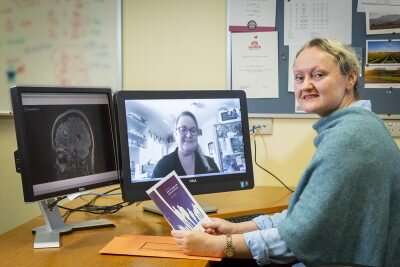This article has been reviewed according to Science X's editorial process and policies. Editors have highlighted the following attributes while ensuring the content's credibility:
fact-checked
peer-reviewed publication
trusted source
proofread
Enhancing quality of life for brain tumor survivors

Every day in Australia, six people are diagnosed with a brain tumor and four will die, making services to enhance quality of life for individuals and their families imperative.
Griffith University-led research studies reveal the positive impact of the telehealth Making Sense of Brain Tumor (Tele-MAST) initiative and illustrates the 10-session videoconferencing program decreases depression and anxiety and has potential to ease the financial burden to the health care system.
Following 16 years of development, the Tele-MAST program aimed at improving quality of survivorship and psychological well-being, is now rolling out nationally. The research is published in the journal Psycho-Oncology.
Clinical neuropsychologist with the Griffith School of Applied Psychology and Research Director of The Hopkins Center, Menzies Health Institute of Queensland (MHIQ), Professor Tamara Ownsworth said individuals with brain tumor experienced diverse side effects such as epilepsy, severe fatigue, nausea, confusion, and distress which could lead to social isolation and depression.
"We found participants who received the Tele-MAST program were four times more likely to become less depressed and also reported significantly reduced anxiety and increased quality of life compared to people receiving standard care (telephone-based counseling)," Professor Ownsworth said.
"As part of this study, we evaluated the cost-effectiveness or 'value for money' of the telehealth intervention by comparing the inputs and outputs of the intervention with standard care.
"We did this by collecting data on the resources used to deliver the intervention together with uptake of psychological service use and observed the improvements in participants' well-being."
According to health economist Professor Louisa Gordon of the QIMR Berghofer Medical Research Institute, who conducted the health economic analysis, the intervention was not only effective but represented a good investment for health services.
"Overall, the Tele-MAST intervention was found to be a cost-effective intervention for improving the mental health of people with brain tumor in Australia," Professor Gordon said.
Professor Ownsworth said past research on adjustment to brain tumor found psychological support needs are often overlooked during and after treatment.
"Being diagnosed with and treated for a brain tumor can be a highly stressful experience and many people find it difficult to understand their illness and feel uncertain and worried about the future," Professor Ownsworth said.
"Studies are usually focused on understanding the illness at a cellular level, such as laboratory-based studies which aim to determine how to stop the progression of the tumor."
Griffith Master of Global Health student, Disability and Inclusion Advocate and Ambassador Julia Robertson was diagnosed with a brain tumor in 2003.
Ms. Robertson designed a resource during her Community Internship which helped patients to understand how to use Zoom and this became a valuable resource for the Tele-MAST program.
She said like so many, her diagnosis was an overwhelming rollercoaster which made her feel isolated.
"Among many other symptoms, I had severe memory loss," Ms. Robertson said. "I'd forgotten how to do basic math and I had to retrain my brain to learn and remember things.
"I decided I wanted to help make the lives of people living with a brain tumor a little easier.
Ms. Robertson received a brain tumor diagnosis in 2003, and in 2011 she suffered a stroke and had brain surgery, in 2012 she enrolled at TAFE, then started studying a Bachelor of Science at Griffith University in 2014 and switched to a Bachelor of Psychological Science in 2016.
"I am a stubborn person and I felt so determined that I would retrain my memory and begin studying," Ms. Robertson said.
"I completed my Bachelor of Psychological Science in 2019 at Griffith's School of Applied Psychology then began my Master of Global Public Health in 2020 at the School of Medicine so I would be better armed to help others navigate the unique space that is life with a brain tumor."
More information: Tamara Ownsworth et al, Evaluation of the telehealth making sense of brain tumor psychological support intervention for people with primary brain tumor and their caregivers: A randomized controlled trial, Psycho-Oncology (2023). DOI: 10.1002/pon.6189



















